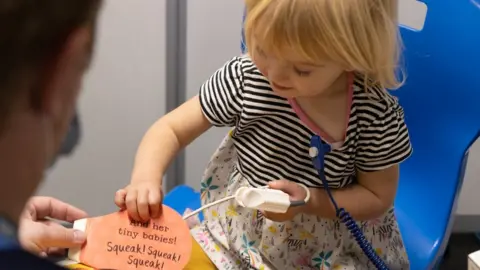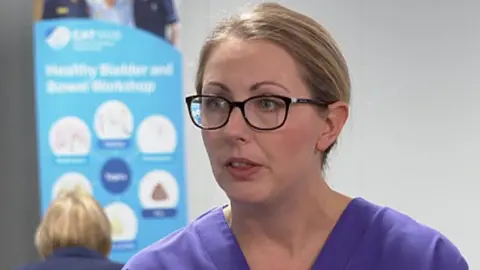RSV: Children's clinic extends hours to cut hospital admissions
 Nimbuscare LTD
Nimbuscare LTDA clinic which treats children and babies with respiratory issues has extended its hours to try and ease pressure on hospital admissions.
York's Children's Ambulatory Treatment (CAT) Hub will now open five days a week, up from two.
The principal cause for child hospital stays is winter bug Respiratory Syncytial Virus (RSV).
Nationally, almost 30,000 hospital admissions come as a result of the virus each year.
Dr Daniel Kimberling said the hub, which treats under 12s with all respiratory illnesses, was ramping up operations after seeing a rise in cases of children attending hospital.
"We want to be ready for winter," the medical director added.

What is RSV?
- Respiratory syncytial virus, or RSV, is one of the common viruses which cause coughs and colds
- It is transmitted by large droplets from contact with an infected person
- For most people it causes a mild respiratory illness
- For a small number of people, who are at risk of more severe respiratory disease such as the very young or elderly, RSV might cause pneumonia or even death
- Symptoms include a runny nose, sneezing, nasal congestion, a cough and sometimes a fever
- RSV is the leading cause of bronchiolitis in babies and infants
- More than 60% of children have been infected by their first birthday and that rises to 80% by the age of two
- RSV accounts for approximately 450,000 GP appointments, 29,000 hospitalisations and 83 deaths per year in children and adolescents, the majority in infants.
Sources: UK Health Security Agency (UKHSA), NHS, House of Lords Library

Dr Brown said the service, which includes experienced children's nurses working alongside a GP, was able to spend more time with children and their parents.
"In a GP surgery you might have 15 minutes," she said.
"You've not got the time to sit down with parents and explore all of their worries and provide that education about what they can do at home."
Children are referred to the clinic by GPs or other health professionals and are monitored for two hours, enabling decisions to be made about what care or treatment is needed.
Libby, who had taken her daughter to the clinic, said it was much easier to access and be reassured about her daughter's health than go to hospital.
"We'd normally have to go to A&E and spend about six hours to get the same treatment, just for one tiny bit of medication."

The UK's health regulator recently approved a new treatment for RSV.
The single antibody shot helps stop infants getting chest infections, such as pneumonia, for about six months.
A large study has now begun to find out whether nirsevimab should be offered to all babies in the UK.
Other treatments for RSV already exist and trials of a vaccine have also shown promise.

Follow BBC Yorkshire on Facebook, Twitter and Instagram. Send your story ideas to [email protected].
